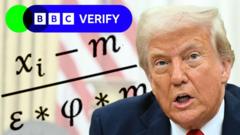As President Trump's fresh tariffs have set off alarm bells across Europe, the bloc is weighing its responses carefully, from negotiating to potential retaliatory measures.
Europe's Strategic Options Amid Trump's Tariff Headwinds

Europe's Strategic Options Amid Trump's Tariff Headwinds
European leaders consider a range of responses to recent U.S. tariffs as the EU aims for a cooperative solution but prepares for a potential economic showdown.
In the wake of President Trump's sweeping tariff announcement, which significantly impacts the European Union (E.U.) as its largest trading partner, European leaders have signaled their intent to respond decisively. With 27 member nations behind them, the E.U. possesses substantial economic leverage, making it an influential player on the global stage.
Ursula von der Leyen, president of the E.U. executive arm, expressed disappointment with the United States, stating that it feels “let down by our oldest ally.” This sentiment reflects a broader frustration within the E.U. regarding the unpredictability of U.S. trade policy.
Among the potential responses being considered are imposing trade barriers specifically targeting large U.S. firms, particularly in the technology sector, which generates considerable revenue from Europe. European officials have begun to compile lists of potential tariffs that could be enacted as soon as mid-April, with discussions anticipated to take place at upcoming meetings of member state representatives.
While there is a commitment within the E.U. to pursue dialogue as a primary solution to this trade tension, the recent turn of events has left them with few options. Political analysts suggest that retaliatory tariffs may escalate further, particularly in reaction to auto tariffs and the newly introduced 20 percent levy on European goods, potentially impacting a wide range of industries.
The E.U. has historically advocated for free trade and increased cooperation among nations, and its leaders remain adamant that implementing tariffs is detrimental to all parties involved. As the trade commissioner prepares for discussions with U.S. counterparts, the focus remains on finding a diplomatic resolution rather than a trade war, despite the landscape of uncertainty and tension that is currently brewing.
Ursula von der Leyen, president of the E.U. executive arm, expressed disappointment with the United States, stating that it feels “let down by our oldest ally.” This sentiment reflects a broader frustration within the E.U. regarding the unpredictability of U.S. trade policy.
Among the potential responses being considered are imposing trade barriers specifically targeting large U.S. firms, particularly in the technology sector, which generates considerable revenue from Europe. European officials have begun to compile lists of potential tariffs that could be enacted as soon as mid-April, with discussions anticipated to take place at upcoming meetings of member state representatives.
While there is a commitment within the E.U. to pursue dialogue as a primary solution to this trade tension, the recent turn of events has left them with few options. Political analysts suggest that retaliatory tariffs may escalate further, particularly in reaction to auto tariffs and the newly introduced 20 percent levy on European goods, potentially impacting a wide range of industries.
The E.U. has historically advocated for free trade and increased cooperation among nations, and its leaders remain adamant that implementing tariffs is detrimental to all parties involved. As the trade commissioner prepares for discussions with U.S. counterparts, the focus remains on finding a diplomatic resolution rather than a trade war, despite the landscape of uncertainty and tension that is currently brewing.




















